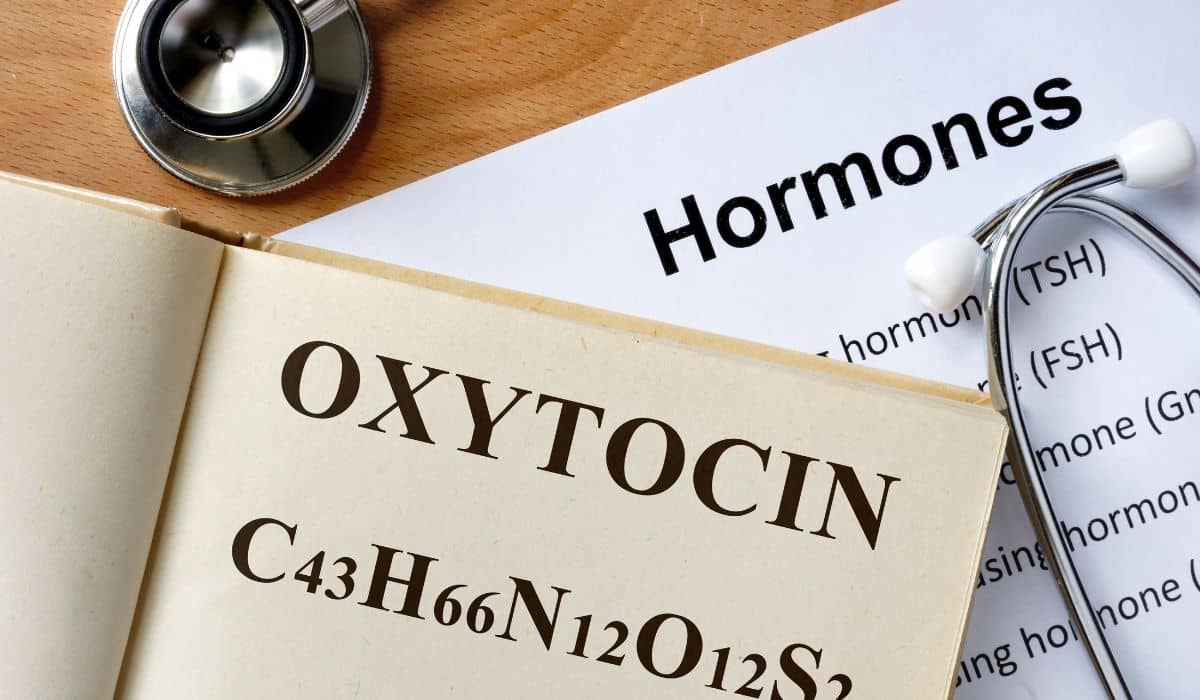(Note: don’t confuse oxytocin with oxycontin. The first is the hormone we’re talking about; the second is a narcotic painkiller. Nobody is advocating narcotics for weight loss!)

Oxytocin: it’s the hormone that causes uterine contractions and makes pregnant women to go into labor. It causes the breast tissue contractions that “let down” breastmilk during breastfeeding. And it’s also the “bonding hormone” that gets released during sex and orgasm. But wait, there’s more! Oxytocin is a real multitasker.
Did you know that oxytocin is also huge for regulating body weight and appetite? Here’s a sample of some recent studies:
- This study showed that if you take a mouse and knock out its oxytocin receptors, the mouse will become obese even without eating any more food than it usually does.
- This one showed that if you take an obese rat and give it extra oxytocin, the rat stops eating and loses weight. This effect is the same no matter what kind of diet (high-fat or low-fat) you used to make the rat obese in the first place. There’s also no evidence that the rats get resistant to the oxytocin in the long run.
- Two of the known obesity-causing genetic abnormalities in humans (SIM1 mutations and Prader-Willi syndrome) might cause constant hunger and almost untreatable obesity via lowering oxytocin levels.
- If you give men oxytocin while they’re eating, it reduces their calorie intake, increases levels of other appetite-reducing hormones, and improves insulin sensitivity.
- In this study, the researchers found that in humans, oxytocin reduced “reward-driven snack intake in the absence of hunger” – in other words, cravings-driven eating. Oxytocin also lowered blood sugar spikes in response to food.
And hey, bonus!
- Oxytocin can help preserve or restore normal gastric function even in mice under chronic stress. You know how some people get horrible gastrointestinal symptoms when they’re stressed? Stress is a major cause of gastrointestinal pain and it’s often a trigger for irritable bowel syndrome and other problems. And apparently, oxytocin might be the antidote.
Not too shabby, just for one hormone.
How? Why?
Here’s a free full-text study if you really want to get into some details, but the short version is…
Oxytocin is mostly produced in two areas of the brain, the PVN (paraventricular nucleus) and the SON (supraoptic nucleus). As well as various social/bonding-related situations (more on that in a minute), oxytocin is produced in response to all kinds of food-related stimuli:
- Eating food sends various signals to these parts of the brain and affects oxytocin. For example, gastric distention (the physical presence of food in your stomach) can “turn on” oxytocin production and make you feel less hungry.
- Energy availability in general affects oxytocin levels. If you eat more food than you need, oxytocin levels increase and reduce your appetite. If you undereat, oxytocin levels decrease and make you hungrier.
- Oxytocin interacts with all kinds of other appetite signaling hormones. It doesn’t work alone! Other “I’m full” hormones can increase oxytocin production, and lower levels of those hormones can reduce oxytocin levels.
Oxytocin affects both appetite and metabolism.
After it’s produced in the brain, oxytocin can affect appetite and digestion through the gut-brain axis. That’s how it ends up regulating gastrointestinal symptoms and gut motility (gut motility is basically how fast things are moving, with diarrhea at one extreme and constipation at the other, and the “just right” spot in the middle).
Oxytocin generally reduces appetite and it also affects reward pathways in the brain – that’s how it can turn down cravings as well as hunger (they’re different things! You can crave a food without being physically hungry). It’s possible that oxytocin specifically reduces desire for sugar, but that’s mostly been studied in rats.
On top of affecting appetite, it seems like oxytocin also affects energy expenditure – how many calories your body burns just from living. That’s probably how rats with oxytocin deficiencies get fat eating the same amount of food: their metabolisms slow down.

What This Means for You
So now we have a hormone, oxytocin, and we know it can help regulate weight by reducing cravings and binge urges, lowering appetite, and speeding up metabolism – at least in rats and mice. There haven’t been any long-term studies on this in humans, but considering the evidence from obesity genetics and the short-term studies on food intake, it’s likely that it works the same way. Great! So how do you get more of it? Are there foods that raise or lower oxytocin levels?
First of all, there’s absolutely no point taking oxytocin pills or trying find foods “high in oxytocin.” It’s destroyed in your stomach so even if you somehow got hold of a bunch and ate it, you wouldn’t get any benefit. When people get oxytocin in studies, they get it through an injection or a nasal spray, not a pill.
But here’s one study: chronic sugar intake reduces the amount of oxytocin that your brain makes in response to food. Regular sugar consumption reduces the strength of the “I’m full” signal that you get from oxytocin – or at least it does if you’re a mouse. It’s important to bear in mind that this is one study and it was done in mice, so it’s not totally obvious that the same results will apply to humans. But it’s still suggestive, and it might explain a lot of people’s lived experience with sugar. A low-sugar diet might be one good option to increase the oxytocin signal that you get in response to food. (One more win for food quality over food quantity for weight loss, here).
Other than avoiding sugar, the best way to raise oxytocin levels in the human body isn’t through food at all. Here are a couple of studies:
- Getting a massage triggers oxytocin release.
- Petting a dog or cat triggers oxytocin release. In fact, just looking at a dog might do it (it does have to be a dog you know and like, though – so far, there’s no evidence that just walking around looking at random dogs on the street raises oxytocin levels).
- Touching another human (hugging, holding hands…) triggers oxytocin release.
- And of course, having sex triggers oxytocin release.
Breastfeeding will also work if you happen to be a new mom with a hungry baby handy (oxytocin release may be one reason why some women lose so much weight during breastfeeding), but for most of us, that’s not really an option.
Summing it Up
The big weakness of the oxytocin connection is that there haven’t been any long-term studies where humans got nasal oxytocin and lost weight in the long term. But considering the short-term evidence from humans and the long-term evidence from rats, it does seem like there’s something there.
If there really is something to the oxytocin connection – and it looks like there is – then it’s one more piece of evidence that human health isn’t separate from the rest of our lives. Paleo is more than just eating the right things; it’s about the whole big picture of mind and body. Maybe we weren’t designed to eat processed sugar, but we also weren’t designed to live without a “tribe” to give us some quality human contact on the regular. Obesity is a symptom of both problems, not just the food.
And anyway, it’s not like getting more hugs or petting more dogs ever did anyone any harm!





Leave a Reply